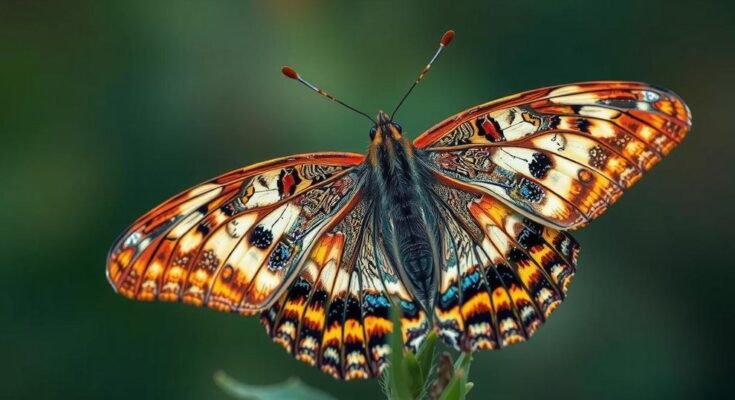Climate change is threatening butterfly populations in Greece, which is home to 237 species. Rising temperatures lead to food scarcity and reduced flowering periods, potentially resulting in smaller butterflies. A research project is measuring these impacts, indicating that climate change is adversely affecting their vital life processes.
Climate change is increasingly presenting challenges for the diverse butterfly populations in Greece, where approximately 237 species reside. Within a controlled environment at a zoo near Athens, researchers observe vibrant butterflies feeding on orange slices, a stark contrast to the harsh realities faced outdoors. Rising temperatures have led to a decline in food resources, shortened flowering seasons, and possibly shrinking butterfly sizes. This phenomenon is further reflected globally, with notable population declines observed in regions such as Mexico and Britain. Konstantinos Anagnostellis, an esteemed agronomist, emphasizes, “Climate change is impacting butterflies … that rely on temperature to perform essential activities such as mating, reproduction, growth, and feeding.” Anagnostellis is affiliated with the MEIOSIS project at the University of Ioannina, where scientists are diligently measuring the body weight of over 50,000 butterfly specimens across a century to ascertain how climate change is influencing their average size. The escalating heat encourages butterflies to relocate to cooler regions, which typically provide less nourishment. Furthermore, the increasing frequency of wildfires in Greece exacerbates the situation by destroying essential grasslands that serve as food sources. Anagnostellis elaborates, “If these plants are burned, there is a risk of direct mortality for the larvae, and we may not have adult butterflies to reproduce, forcing them to migrate to other areas.”
The article highlights the impact of climate change on butterfly populations in Greece, which is among the countries facing significant environmental challenges that affect biodiversity. Butterflies, known for their aesthetic beauty and crucial role in ecosystems, are particularly sensitive to fluctuations in temperature and food availability. The study spearheaded by the University of Ioannina, MEIOSIS, is focused on tracking changes in butterfly morphology as a response to climate variations over an extensive period. This research underscores the broader implications of climate change, not only in Greece but also on a global scale, where similar trends in butterfly populations are being documented.
In summary, the escalating challenges posed by climate change are severely affecting butterfly species in Greece, with implications that extend beyond just local habitats. Researchers are observing shifts in behavior, food scarcity, and physical changes among butterflies, prompting concerns about future population viability. Continued research and conservation efforts are essential to addressing and mitigating the impact of these environmental changes on butterfly ecology.
Original Source: www.swissinfo.ch




